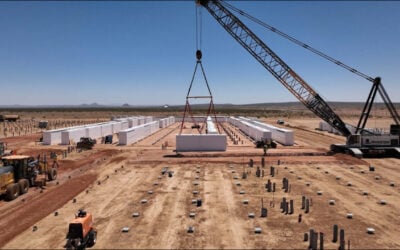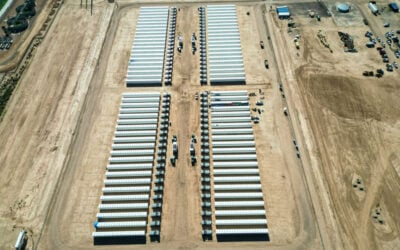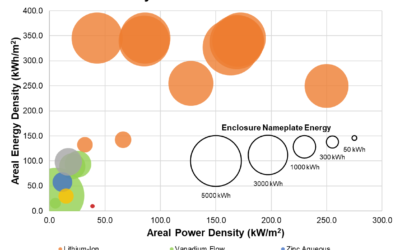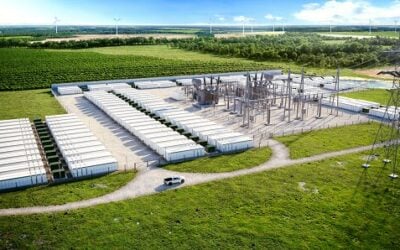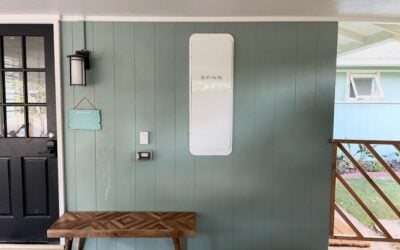By joining alliance partners based in different geographies, the firm’s customer reach is growing rapidly. Credit: AES
US-based Storage provider AES Energy Storage has made significant expansions away from established markets into relatively untapped regions across the globe.
By joining alliance partners based in different geographies, the firm’s customer reach is growing rapidly, although it must deal with the challenges of entering new countries, which tend to have different storage regulations and differing levels of understanding in the value of energy storage.
Enjoy 12 months of exclusive analysis
- Regular insight and analysis of the industry’s biggest developments
- In-depth interviews with the industry’s leading figures
- Annual digital subscription to the PV Tech Power journal
- Discounts on Solar Media’s portfolio of events, in-person and virtual
For example, AES recently teamed up with power electronics and engineering group Eaton to supply AES’s Advancion battery-based energy storage systems to utilities, industrial and commercial customers and IPPs in Central and Eastern Europe, Nordic countries, the UK, South Africa and Morocco.
Brian Perusse, vice president of international market development for AES energy storage, told Energy-Storage.News that AES currently operates projects in four countries, Chile, UK, the US and the Netherlands. However, the coming year will see more projects coming online in the Philippines, Dominican Republic and India.
AES’s Advancion 4, the latest design introduced in November 2015, includes racks of lithium-ion batteries that can be scaled for standard configurations from sub-100 kW to over 1GW, and from 15 minutes of duration to over four hours without any reengineering. The system is a means of grid stabilization and balancing when using renewable energy technologies.
Perusse said that by partnering with Eaton as well as Japanese firm Mitsubishi Corporation, the Advancion product is now available globally.
He also highlighted particular European markets that AES believes hold the most promise at present. These include the UK, much of Eastern Europe, as well as Italy and Germany.
Perusse said: “In certain markets right now the goal is to build out a lot of transmission lines to integrate more of the systems to handle renewables. A lot of Europe is looking at that and storage is a much better choice to manage transmission or distribution upgrades.”
AES already has good leads and relationships with potential customers in Jordan and other Middle Eastern countries, meanwhile, South Africa and Morocco are the two stand out nations on the African continent, according to Perusse.
Referring to Africa, Perusse said: “There is loads of growth that happens, but it is slow, so you cannot build 100MW or 200MW [storage] to meet the load growth.
“You could do incremental load growth with storage versus 100MWp for example. Those are huge savings by just putting in 10MW [storage] every year for 10 years versus 100MW one year and not needing the whole amount.”
Perusse also said the commercial and industrial space and the potential for diesel replacements is a huge driver for AES products. For such customers, the Advancion system can provide significant savings on electricity and operational expenses through demand charge management and load shifting. Meanwhile, customers can also maximize on-site production and self-consumption of renewable energy consumption and minimize curtailment at grid level.
AES decided to opt for alliance partnerships, when it found strong demand from countries, where it was not actually capable of operating its own assets. Thus in order to sell its product in South Africa and Australia for example it had to find a partner to bring the products to those markets. As it happens AES has already collaborated with both Eaton and Mitsubishi in previous endeavours.
Perusse said AES continues to evaluate potential partners as it looks to move into even more markets.
He added: “We have Advancion-certified alliance partners – we are looking to build a small but reputable global network of these.”
He also said: “The main challenge is getting into each market – the rules and regulations in each market is different. Meanwhile, getting the team on the ground to understand the value of energy storage is usually the biggest challenge.”
In any case, AES continues to work with around 25 regulators in different countries on how to integrate storage.
last year AES signed a multi-year agreement for Korean battery supplier LG Chem to provide 1GWh of lithium-ion battery capacity for AES’s Advancion products, which a US analyst said could take around seven to eight years to install and be worth an estimated US$300 million.

